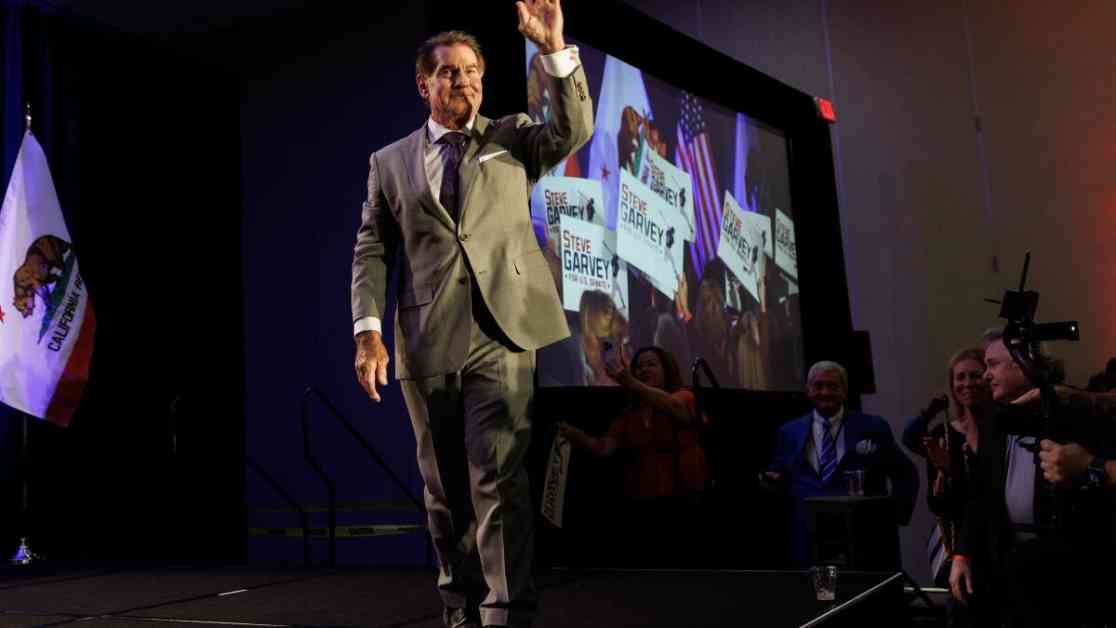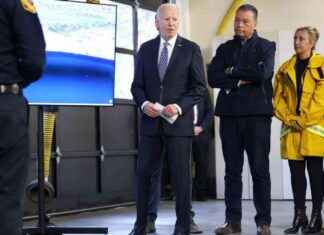Former President Trump made headlines when he declined to endorse Republican candidate Steve Garvey in California’s U.S. Senate race during a recent visit to the state. Trump’s remarks came during an event at his Rancho Palos Verdes golf course, where he expressed his belief that Garvey had not reached out to the MAGA (Make America Great Again) movement for support.
Trump stated, “I don’t know much about Steve Garvey. I think he’s made a big mistake because he hasn’t reached out to MAGA, and if he doesn’t have MAGA he’s got no chance.” This comment highlighted the importance of seeking Trump’s endorsement in the eyes of many Republicans, especially in a state like California where the former president still maintains a strong base of support.
Contradicting himself slightly, Trump also mentioned that Garvey could potentially win if he were to secure the “MAGA endorsement,” but he also expressed doubts about the fairness of elections in California. According to Trump, “If you had an honest election, he’d win. But you don’t have an honest election.” These conflicting statements from Trump added another layer of complexity to the Senate race and highlighted the challenges faced by Republican candidates in a predominantly Democratic state.
In response to Trump’s comments, Steve Garvey emphasized that he was running a different kind of campaign, one that focused on reaching out to the Latino community in California and addressing key issues such as affordability, public safety, border security, homelessness, and leadership. Garvey made it clear that he had not sought any political endorsements other than those from the law enforcement community and first responders, signaling his commitment to running a grassroots campaign that prioritized the needs and concerns of Californians.
Garvey’s decision to distance himself from seeking traditional political endorsements and instead focus on engaging with the community and addressing critical issues demonstrated his willingness to chart his own path in the Senate race. By prioritizing the concerns of everyday Californians and highlighting his commitment to serving the state, Garvey aimed to differentiate himself from the typical partisan politics that often dominate election campaigns.
Trump also took the opportunity to criticize Garvey’s opponent, Rep. Adam B. Schiff, a prominent Democrat who has been a vocal critic of the former president. Trump referred to Schiff as “one of the sleaziest politicians in history” and “one of the most disgusting human beings,” highlighting the intense political animosity between the two figures. Trump’s disparaging remarks about Schiff underscored the deep divisions and personal animosities that often characterize modern politics.
In contrast to his harsh criticisms of Schiff, Trump described Garvey as “a nice guy” but admitted that he did not know him well. Despite this, Trump suggested that Garvey should reach out to him, indicating a potential willingness to offer his endorsement if approached. Trump’s mixed signals towards Garvey reflected the complex dynamics at play in the Senate race, where candidates navigated the delicate balance of seeking endorsements while also maintaining their independence and authenticity.
Garvey’s decision to run a campaign focused on the people of California rather than partisan interests or endorsements highlighted his commitment to representing all constituents and addressing their needs. By emphasizing his dedication to serving the state and engaging with diverse communities, Garvey aimed to position himself as a candidate who prioritized the interests of Californians above all else.
As the Senate race in California continued to unfold, the contrasting strategies of Garvey and Schiff reflected the broader political landscape in the state. While Schiff relied on his record of standing up to Trump and championing Democratic values, Garvey sought to connect with voters on a more personal level and address the pressing issues facing Californians. The divergent approaches of the two candidates underscored the diverse perspectives and priorities within the electorate.
In the midst of a highly polarized political environment, Garvey’s decision to distance himself from seeking Trump’s endorsement and instead focus on engaging with communities and addressing key issues signaled a commitment to serving the people of California. By prioritizing the concerns of constituents and running a campaign that centered on the needs of everyday Californians, Garvey sought to differentiate himself from traditional political norms and offer a fresh perspective on leadership and representation.
Garvey’s Grassroots Approach
Steve Garvey’s decision to run a grassroots campaign that eschewed traditional political endorsements in favor of engaging directly with communities reflected a commitment to serving the people of California. By focusing on the concerns of everyday Californians and addressing key issues such as affordability, public safety, border security, homelessness, and leadership, Garvey positioned himself as a candidate who prioritized the needs of constituents above partisan interests.
Garvey’s emphasis on reaching out to the Latino community in California underscored his commitment to inclusivity and representation. By engaging with diverse communities and listening to their concerns, Garvey demonstrated a willingness to connect with a broad cross-section of constituents and ensure that their voices were heard in the political process. This grassroots approach highlighted Garvey’s dedication to serving all Californians and addressing the challenges they faced.
Political Dynamics in California
The Senate race in California exemplified the complex political dynamics at play in the state, where Democrats held a significant advantage in voter registrations. Despite this, Republicans like Garvey continued to vie for elected office and seek to represent the diverse interests of Californians. Trump’s comments about the importance of seeking his endorsement highlighted the influence of the former president within the Republican Party and the challenges faced by candidates who sought to navigate the political landscape in California.
The contrasting strategies of Garvey and Schiff underscored the diverse perspectives and priorities within the electorate. While Schiff focused on his record of standing up to Trump and championing Democratic values, Garvey emphasized his commitment to representing all constituents and addressing their needs. The differing approaches of the two candidates reflected the broader political divisions in California and the competing visions for the state’s future.
The Path Forward
As the Senate race in California progressed, the strategies and messaging of candidates like Steve Garvey and Adam B. Schiff highlighted the complex dynamics of modern politics. Garvey’s grassroots approach and focus on engaging with communities demonstrated a commitment to serving the people of California and addressing their needs. By prioritizing inclusivity, representation, and leadership, Garvey aimed to offer a fresh perspective on politics and governance in the state.
In the face of intense political polarization and division, Garvey’s decision to run a campaign centered on the concerns of everyday Californians stood out as a testament to his dedication to serving the state. By eschewing traditional endorsements and focusing on engaging with communities, Garvey signaled a commitment to representing all constituents and addressing the pressing issues facing California. As the Senate race unfolded, the contrasting approaches of candidates like Garvey and Schiff illuminated the diverse voices and perspectives that shaped the political landscape in California.



























